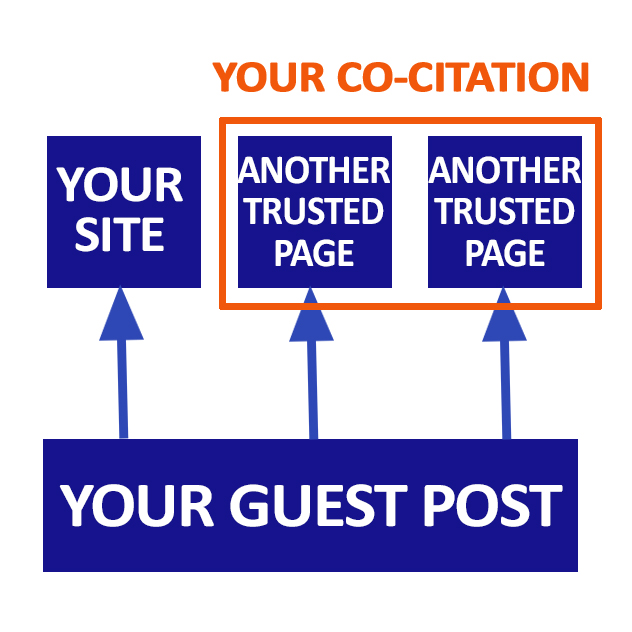 *Join our Twitter chat on TwChat =>MyBlogGuest Twitter chat*
*Join our Twitter chat on TwChat =>MyBlogGuest Twitter chat*
Even though it seems to be a hot trend now, co-citation is not a new topic in web marketing world. @jimboykin blogged about co-citation back in 2006, for example; but for some reason it seems so hard to believe that few people care to think about it (“What? Giving someone free links???” – that’s the philosophy we are fighting with!).
Co-citation is about analyzing your link neighbors. If we talk about a guest blogging in particular, here’s how it looks:

- If Google sees trusted URLs next to your backlink, they use it as a good signal
- On the other hand, if Google sees your site linking to trusted pages that help the user, they use it as a good signal
- In other words, it benefits BOTH the author and the publisher; THEREFORE we’ve been encouraging linking out more than just to yourself for ages.
Academics have been using co-citation since the dawn of the printing press. Much of the algorithm is academic in nature. #myblogguest
— Don Sturgill (@Don_Sturgill) May 16, 2013
@jeremybenno I think they mean that co-citation allows both author and blogger to support eachother #myblogguest
— Givelify (@Givelify) May 16, 2013
If it’s just your link in an article, it looks weird and it reads less useful. But what if you are helping yourself as well as the reader and send positive signals to Google by simply linking out to someone except yourself?!
What is a “Trusted” Link?
Simply but, it’s whatever you feel useful for the reader of your article (and surely NOT competing with your own page). If you need specific tips, here are two:
- Any .gov, .edu, wiki page that explains what you have just mentioned (search on Google: “loans site:gov“). CNN, BBC, NYTimes articles are also trusted as well as official city sites, official stats sources, etc..
- Any authentic blogger you like reading: Blogs are powerful source of “social signals” and on top of that, by linking to them, you build your relationships with them – which is ALL we are about here!
And it's great when the N.Y. Times links back — one of our My Blog Guest publishers discovered that this week! #myblogguest
— Don Sturgill (@Don_Sturgill) May 16, 2013
Google has been offering a free public tool to check your common co-citation for ages; just search related:URL (example: related:http://myblogguest.com). Don’t expect that to be an exact science though: Google will never show you the actual picture but it does give you a good snapshot.
Basically, co-citation shows who Google associate your web page with; how Google categorizes your page.
Like I said, it’s really a simplified way to look at co-citation, but that’s all you need to know to write and publish killer guest articles that help both sides!
To get a deeper understanding of co-citation, watch Rand’s Whiteboard Friday – it’s not only about links: By simply mentioning influential brands and people, you may be sending signals to Google as well!
Joseph
Latest posts by Joseph (see all)
- Chatting Guest Blogging at #Pitchboxchat - December 19, 2018
- How to Collaborate on Content: Co-Create, Interview and Find Guest Bloggers! #BizapaloozaChat - December 5, 2017
- Ann Smarty Talking Influencer Marketing at #BW_Chat Twitter Chat - February 26, 2016

David Leonhardt
All I can say is du-uh. Really, I have never understood the idea that one should not link out. If for no other reason, the last thing you want someone to do is to hit the “back” button, essentially telling Google, “Oops. That was a bad site to list in the SERPs”. Even without co-citation benefits, you have to give people somewhere to go when they are done with your website.
Naven
Co-citation is the lesser known strategy or people not use it on their guest posts to make the blog posts not only looks natural, but as per your information’s, it gives authority to a blog post.
Thanks.